The UK Nursing Salary and Pay Scale Guide - 2025
SubscribeUK nursing salary & pay scale guide 2025. Discover how much nurses get paid plus bandings, benefits and more.
(This page reflects the pay rise announced in July 2024)
Topics covered in this guide
NHS Pay Calculator
Agenda For Change NHS Nursing Pay Scale And Bands 2025 to 2026
What Is Agenda For Change?
About Nursing Pay In The UK
What Is The Average Wage For A UK Nurse?
An Analysis Of Private And Public Sector Nursing Pay
What Are The Wider Benefits Of Being An NHS Nurse?
What Are The Pros And Cons Of Bank And Agency Nursing In Terms Of Pay?
How Can I Earn Extra Money As A Nurse?
What Was 'The New Pay Deal'?
What Band Do Newly Qualified Nurses Start At?
What Level Of Responsibility And Duties Can You Expect Within Each Nursing Band?
The Right Pay For The Right Job - Browse Our Jobs
Useful Sites and Further Information
NHS New Pay Deal Calculator
Agenda For Change NHS Nursing Pay Scale And Bands 2025 to 2026
Our Nurse's Pay Calculator is based on Agenda for Change NHS Pay Scales and Bands in England for 2025 to 2026 (April to end of March). Our bandings and calculator have also been updated to reflect the pay rise confirmed in July 2024.
| Band | Minimum years of experience | Pay |
|---|---|---|
| 1 | 0-1+ | £23,614 |
| 2 | 0-1 | £23,614 |
| 1-2 | £23,614 | |
| 2-3 | £23,614 | |
| 3-4 | £23,614 | |
| 4-5 | £23,614 | |
| 5-6 | £23,614 | |
| 6+ | £23,614 | |
| 3 | 0-1 | £24,071 |
| 1-2 | £24,071 | |
| 2-3 | £25,674 | |
| 3-4 | £25,674 | |
| 4-5 | £25,674 | |
| 5-6 | £25,674 | |
| 6+ | £25,674 | |
| 4 | 0-1 | £26,530 |
| 1-2 | £26,530 | |
| 2-3 | £26,530 | |
| 3-4 | £29,114 | |
| 4-5 | £29,114 | |
| 5-6 | £29,114 | |
| 6+ | £29,114 | |
| 5 | 0-1 | £29,969 |
| 1-2 | £29,969 | |
| 2-3 | £32,324 | |
| 3-4 | £32,324 | |
| 4-5 | £36,483 | |
| 5-6 | £36,483 | |
| 6-7 | £36,483 | |
| 7+ | £36,483 | |
| 6 | 0-1 | £37,339 |
| 1-2 | £37,339 | |
| 2-3 | £39,404 | |
| 3-4 | £39,404 | |
| 4-5 | £39,404 | |
| 5-6 | £44,962 | |
| 6-7 | £44,962 | |
| 7-8 | £44,962 | |
| 8+ | £44,962 |
| Band | Minimum years of experience | Pay |
|---|---|---|
| 7 | 0-1 | £46,148 |
| 1-2 | £46,148 | |
| 2-3 | £48,526 | |
| 3-4 | £48,526 | |
| 4-5 | £48,526 | |
| 5-6 | £52,809 | |
| 6-7 | £52,809 | |
| 7-8 | £52,809 | |
| 8+ | £52,809 | |
| 8a | 0-1 | £53,754 |
| 1-2 | £53,754 | |
| 2-3 | £56,454 | |
| 3-4 | £56,454 | |
| 4-5 | £56,454 | |
| 5+ | £60,503 | |
| 8b | 0-1 | £62,215 |
| 1-2 | £62,215 | |
| 2-3 | £66,247 | |
| 3-4 | £66,247 | |
| 4-5 | £66,247 | |
| 5+ | £72,294 | |
| 8c | 0-1 | £74,290 |
| 1-2 | £74,290 | |
| 2-3 | £78,814 | |
| 3-4 | £78,814 | |
| 4-5 | £78,814 | |
| 5+ | £85,601 | |
| 8d | 0-1 | £88,167 |
| 1-2 | £88,167 | |
| 2-3 | £93,571 | |
| 3-4 | £93,571 | |
| 4-5 | £93,571 | |
| 5+ | £101,677 | |
| 9 | 0-1 | £105,385 |
| 1-2 | £105,385 | |
| 2-3 | £111,739 | |
| 3-4 | £111,739 | |
| 4-5 | £111,739 | |
| 5+ | £121,271 |
Find healthcare jobs
1000s of jobs for nurses, AHPs, clinicians, care assistants, managers and more.
Jobs in care homes, hospitals, and the community.
What Is Agenda For Change?
You may have heard of the so-called ‘Agenda for Change’ (AfC). Essentially, AfC was a new system introduced in 2004 that underpinned the banding structure that applies to nursing pay today. It was implemented to correct historic problems with nursing pay – namely, to provide a more structured way of ensuring NHS staff get equal pay for work of equal value.
This idea of allocating roles to specific pay bandings was a new one, and broadly speaking, the system has remained largely unaltered since 2004.
Between April 2018 and March 2021 the new pay structure 'New Pay Deal' in NHS England was rolled out. This has since been followed by one-off, annual pay increases between 3%, 5% and finally 5.5% in 2024. following negotiations between the government and health unions.
About Nursing Pay In The UK
To say nursing pay is a hot topic is something of an understatement. And while it’s widely understood that nursing is a rewarding career, do the financial rewards match the demands of the job?
Between 2010 and 2015, average NHS nursing salaries increased by just over 2%.
Then between 2015 and 2017, a fixed 1% pay rise was implemented – the well-known ‘pay cap’. From 2018 to end of March 2021 The New Pay Deal was implemented where salaries across the board increased over a 3 year period. In July 2021, a 3% pay rise was announced for NHS nurses, followed by a similar increase in 2022 and 2023. Most recently, in July 2024, a 5.5% increase was announced.
However, these headlines don’t tell the full story of nursing pay. Does the private sector, for example, offer higher wages, as is often assumed? Do bank and agency nurses, often working side-by-side with permanent staff, enjoy vastly superior pay packets? And just how good is the NHS pension and other salary-supplementing benefits?
Few jobs carry such a broad range of salary ‘banding’, and few present such intricate differences in terms of private and public sector pay and benefits.
Nursing offers great career flexibility, and that applies to pay too – bank and agency nurses often have the freedom to increase their earnings as and when they need to. For nursing students and aspiring nurses, understanding these factors is vital when considering your future.
Our comprehensive guide to nursing salaries, bandings and pay tackles this complex and often controversial subject with simple facts and insider tips, offering straightforward guidance on all the key factors affecting what nurses earn.
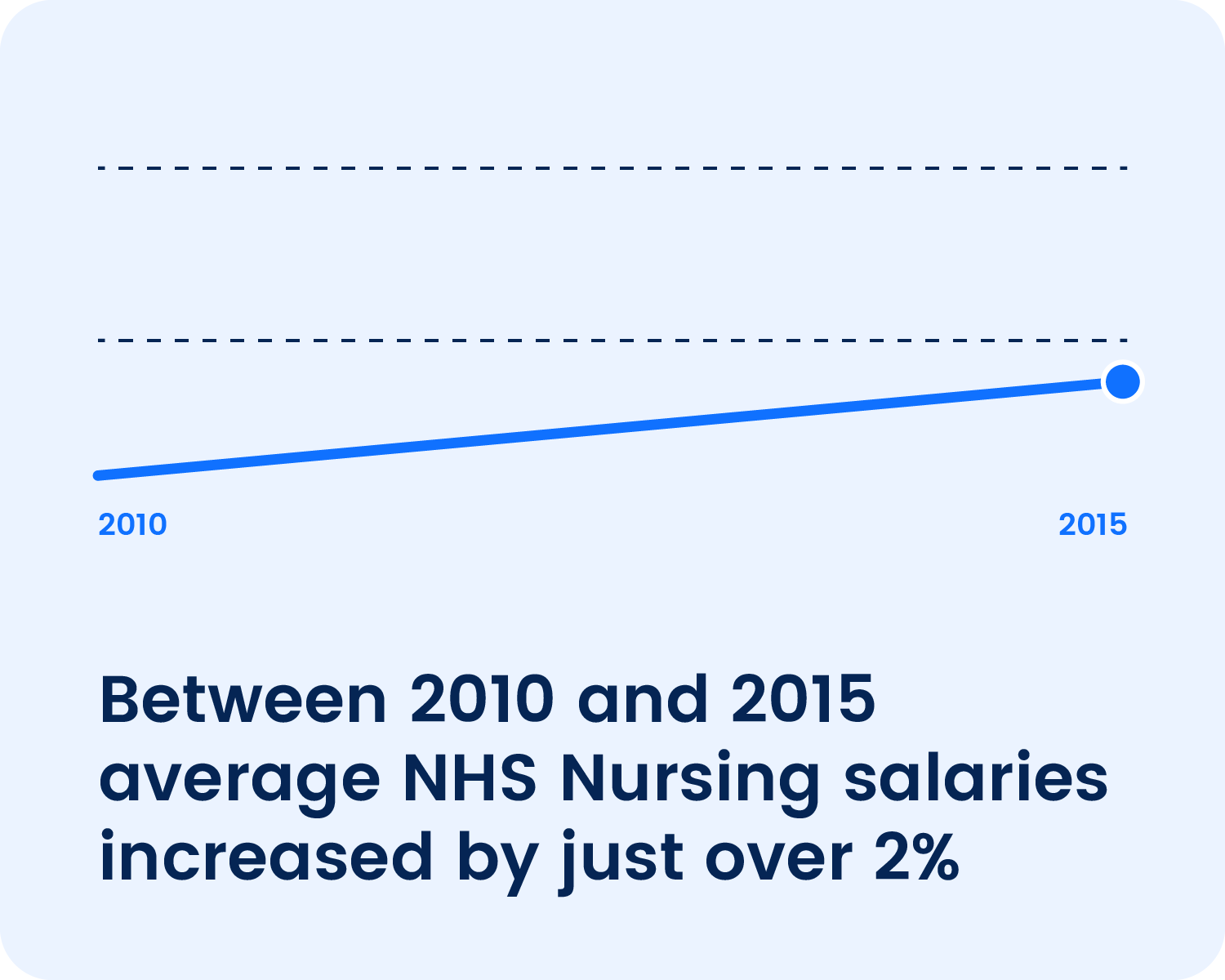
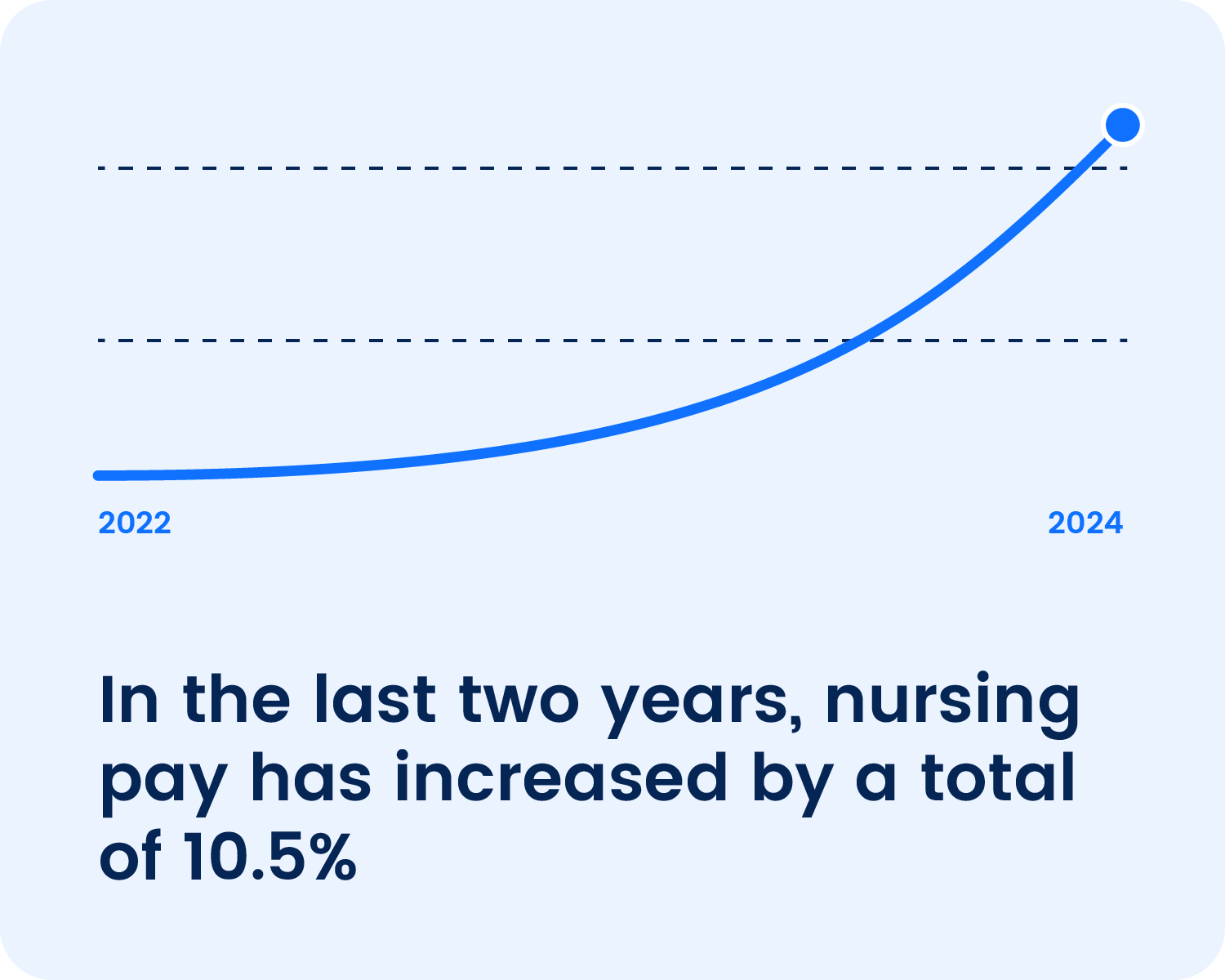
What Is The Average Wage For A UK Nurse?
A question we’re often asked is: what is the average wage of a UK Nurse?
It’s something everyone from aspiring nurses to qualified nurses in other countries are eager to understand.
Finding an ‘average’ is tricky, for a number of reasons.
UK nurses can work in the NHS or the private sector and pay can vary greatly between the sectors. And within the NHS, pay alters according to experience and professional development.
Various job boards and recruitment sites that track the salaries of jobs they post suggest the average wage of a UK nurse is somewhere around the £37,000 to £42,000 a year mark.
Interestingly, more than 50% of Adult nurses are between the age of 41 and 60. And while some people do become nurses in their 40s and beyond, we also know that the vast majority of newly qualified nurses are under the age of 30.
That suggests the average nurse has at least 5 years’ experience, which corresponds with the range above.
It doesn’t necessarily reflect private sector pay but given that the vast majority of nurses work in the NHS, this figure seems the most reliable available.
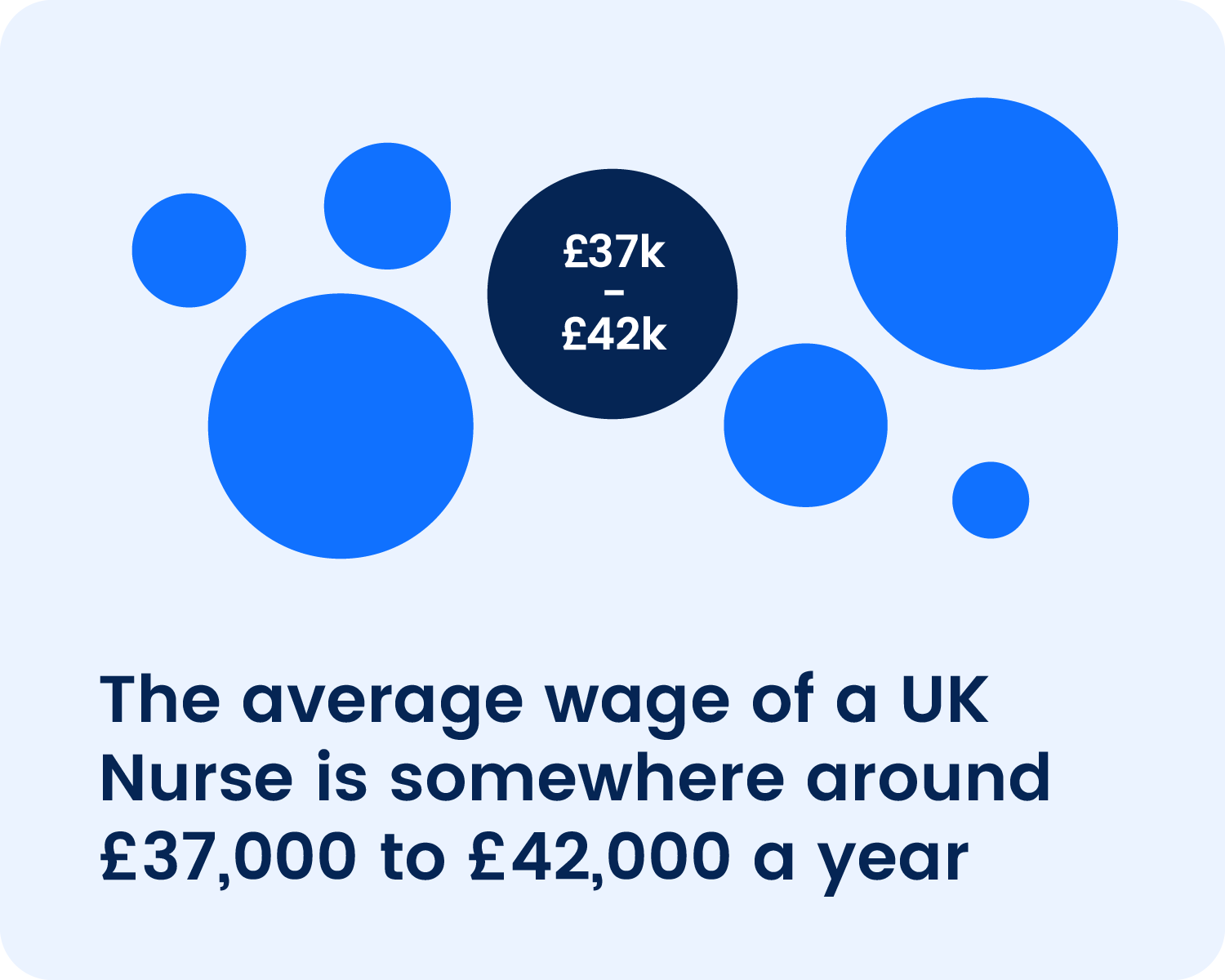
An Analysis Of Private And Public Sector Nursing Pay
While NHS pay for nurses is very clearly structured, private sector pay can vary wildly.
For starters, many private sector nurses who might work for private healthcare organisations, schools or charities typically negotiate their salaries. As is the case in most other industries, jobs can be advertised without clearly defined salaries or will be caveated with ‘salary dependent on experience’.
As a result, the private vs NHS pay debate is an impossible one to solve. Put simply, some private sector nurses will earn more than in the NHS, and some less.
It’s best instead to consider the other factors surrounding this debate – and what kind of person you are. The NHS offers stability and reliability. The salary bandings and benefits are clear and unwavering. You know where you are with an NHS job.
But a private nursing job will operate differently altogether. While you might hit a banding ceiling at the NHS, the same constraints won’t necessarily apply privately. Just like the rest of the UK’s private sector workers, if you think you’re worth more, you can walk into your boss’ office and ask. But nothing is guaranteed – so there are no incremental or government rises.
However, to understand the benefits of being an NHS nurse, you really need to consider the benefits package too…
What Are The Wider Benefits Of Being An NHS Nurse?
One of the best aspects of being an NHS nurse is the inarguably excellent benefits – which do have a meaningful impact on your overall financial circumstances.
Here are some of the best:
- Enhanced pay for unsociable hours – between 30% and 60% above standard rate for night shifts, weekends and bank holidays
- The NHS Pension Scheme remains one of the most generous and comprehensive in the UK (it’s worth noting that employee contributions are typically higher than in the private sector, however)
- 27 days’ holiday per year, plus bank holidays
- Free access to occupational health and counselling support
- Six months full pay and six months half pay for sick leave
- Generous maternity and paternity leave (well above the statutory minimum)
- Vast and varied access to training courses and professional development – often with full support and funding from the trust you work with
For many nurses, it’s actually the benefits that seal the deal when deciding to work for the NHS.
What Are The Pros And Cons Of Bank And Agency Nursing In Terms Of Pay?
Another common misconception surrounds agency work.
Permanent nurses often work alongside agency nurses on particular shifts, and quickly catch on that their hourly rate far exceeds their own. From this, a conclusion is quickly jumped to: I’d earn more as an agency nurse. And this isn’t necessarily the case.
While an agency rate is typically higher, agency nurses don’t get any sick pay or annual leave. Furthermore, there is no guarantee of work, and if you want to work consistently you might be forced to work in locations or disciplines you’d prefer not to. Plus, ‘agency caps’ are being applied to trusts across the country – which is threatening the amount of agency nurses each trust can actually use.
So pay in this instance really is about more than money. For the right person though, being an agency nurse really can pay off. The most successful agency nurses cast their nets widely. They might register for bank work at two neighbouring trusts, and then with a nursing agency too. As a result, they have to be open to a wide variety of opportunities, working in hospitals, medical centres, prisons or schools from one day to the next. But if you’re a nurse looking to build experience and try out other disciplines, this can all work in your favour – all whilst boosting your pay packet.
The bottom line is to understand the kind of person you are, and the kind of nurse you want to be. Both ways of working can be financially rewarding if you approach them in the right way. And you can of course switch whenever necessary – as a qualified nurse, permanent, NHS, private, agency and bank work is all at your disposal.
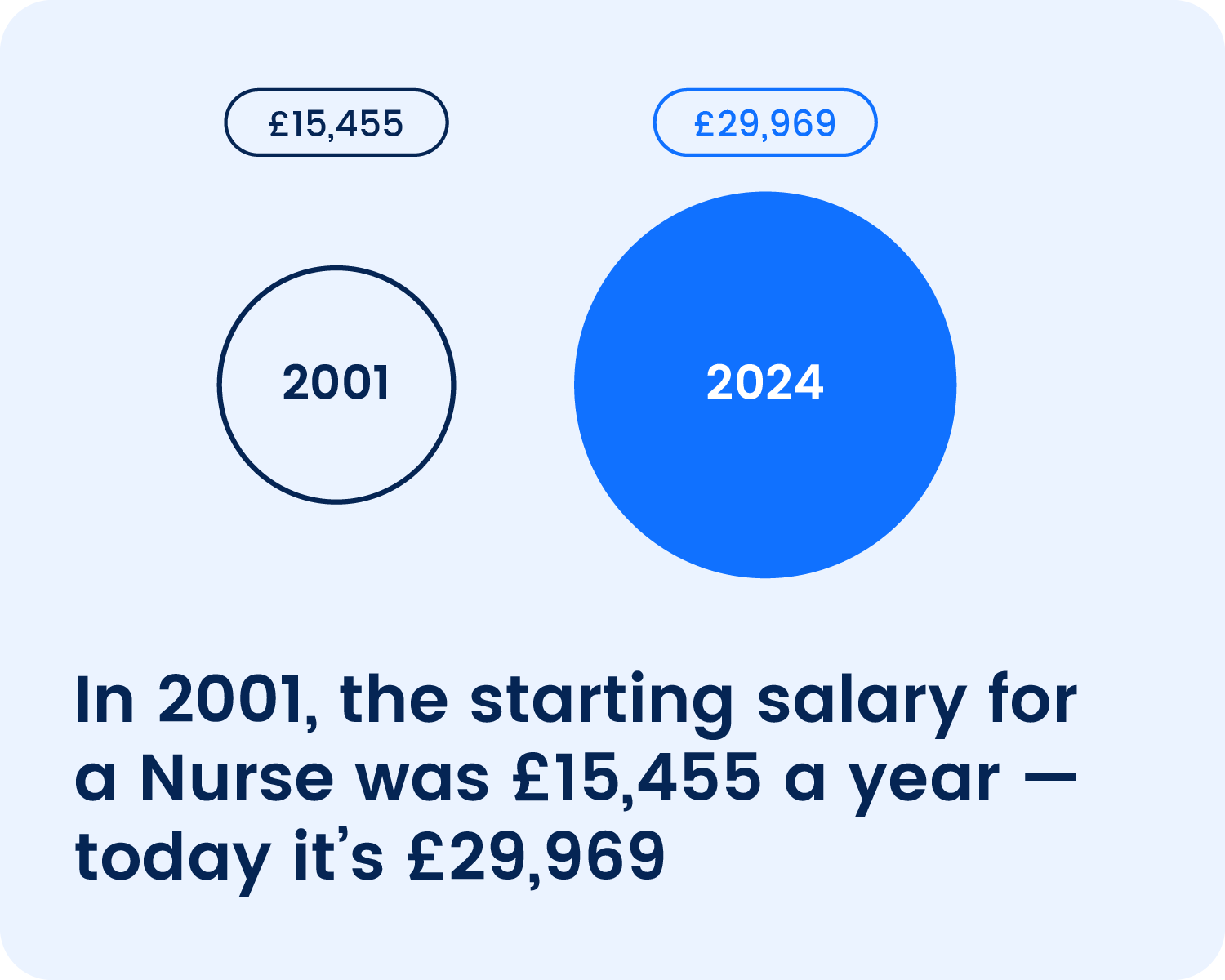
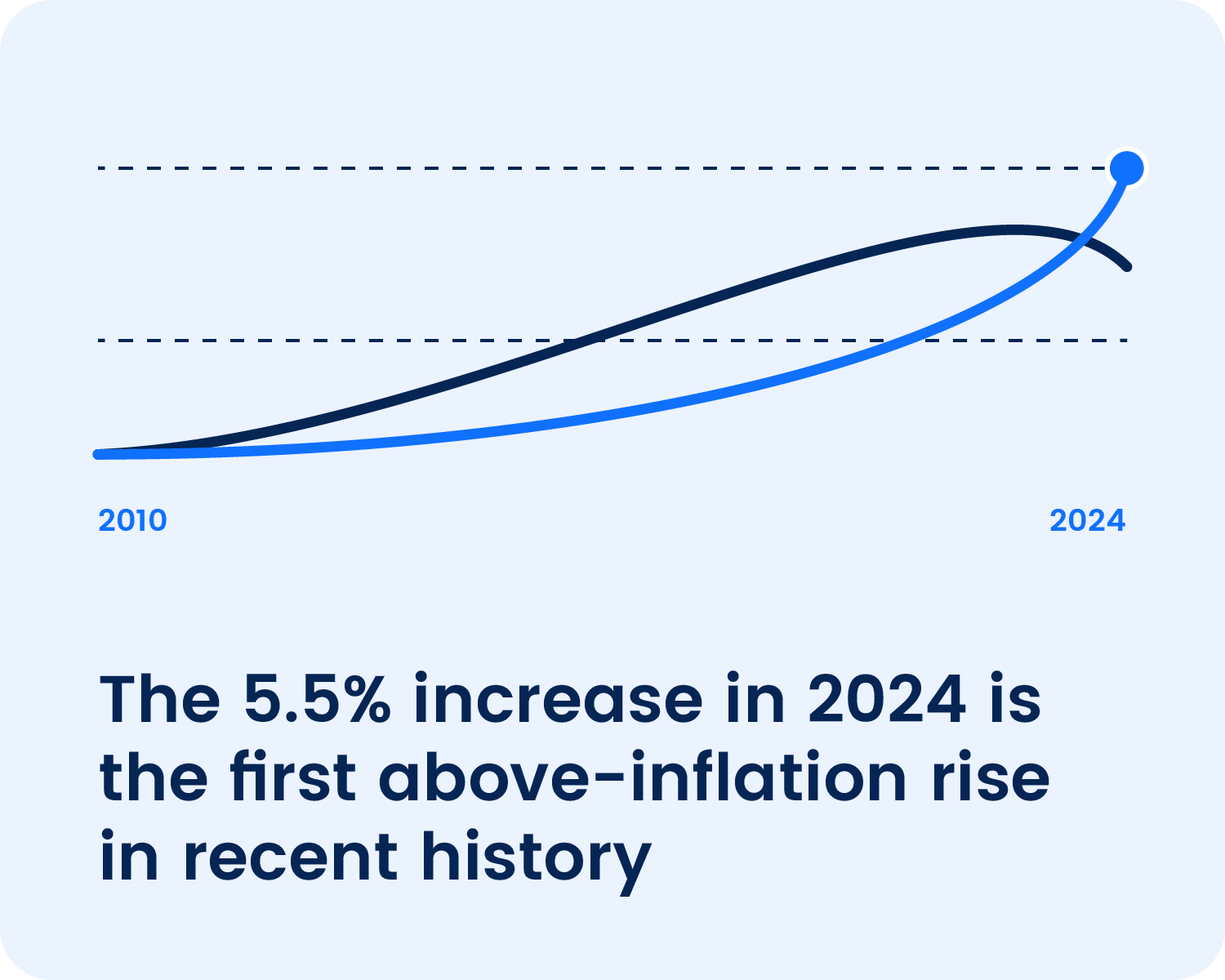
Find healthcare jobs
1000s of jobs for nurses, AHPs, clinicians, care assistants, managers and more.
Jobs in care homes, hospitals, and the community.
How Can I Earn Extra Money As A Nurse?
In the long term, it’s certainly true that maximising your income from nursing will rely heavily on the experience you gain, the skills you develop and the qualifications you accumulate.
But that doesn’t paint the entire picture. There are various ways of earning extra money and many techniques to boost your pay packet throughout your career.
Here are our top tips:
- Choose evening, weekend and bank holiday shifts where possible as these are paid at enhanced rates
- Take extra shifts by registering with your trust’s in-house bank
- Try to take risks by working in different disciplines, different areas and different trusts – as is the case in any job, there is huge value not only in building up a wide range of experience, but also a wide range of contacts
- If you want to work as an agency nurse, sign up to multiple banks and agencies to keep your options open and get more shifts
- Whether provided through a trust or an agency, always make use of training courses – these skills will be vital in moving up within your banding or negotiating a salary increase
- Be entrepreneurial and open-minded. Are there some less conventional ways of making money? Could you, for example, offer tutoring to nursing students? Your skills and knowledge are valuable – so think of other ways of utilising them
- Don’t forget to check your payslips and timesheets carefully. Mistaken overpayments are not uncommon, and a refund is often demanded immediately. So having clear proof of what you have or haven’t been paid is essential
What Was 'The New Pay Deal'?
From 1st April 2018 a restructuring of NHS Pay was set in place. It was called the New Pay Deal and it started a three year process where nurses' minimum salaries would increase by at least 6.5%.
Pay points were retired during this process, and a new banding system was introduced – the pay bands you can view at the top of this guide.
This deal featured a number of changes to existing bandings and pay scales:
- Over the three years between March 2018 and April 1st 2021, nurses saw a minimum salary increase of 6.5%
-
That increase was structured in the following way for most bandings:
- 3 % in 2018/19
- 1.7% in 2019/20 plus a lump sum worth 1.1% paid in April 2019
- 1.7% in 2020/21
- These rates refer to top-of-band nurses – nurses at the bottom of their bandings saw increases of over 10% over the three years
- In some Band 8 and Band 9 positions, pay increases were structured differently
- Band overlaps were removed to ensure that promotions come with meaningful pay increases
- Importantly, the New Pay Deal was funded by new government money – not by removing funding from patient care
- Unsocial hours payments were not affected
The New Pay Deal has been followed by one-off, yearly increases – all of which have been hotly contested.
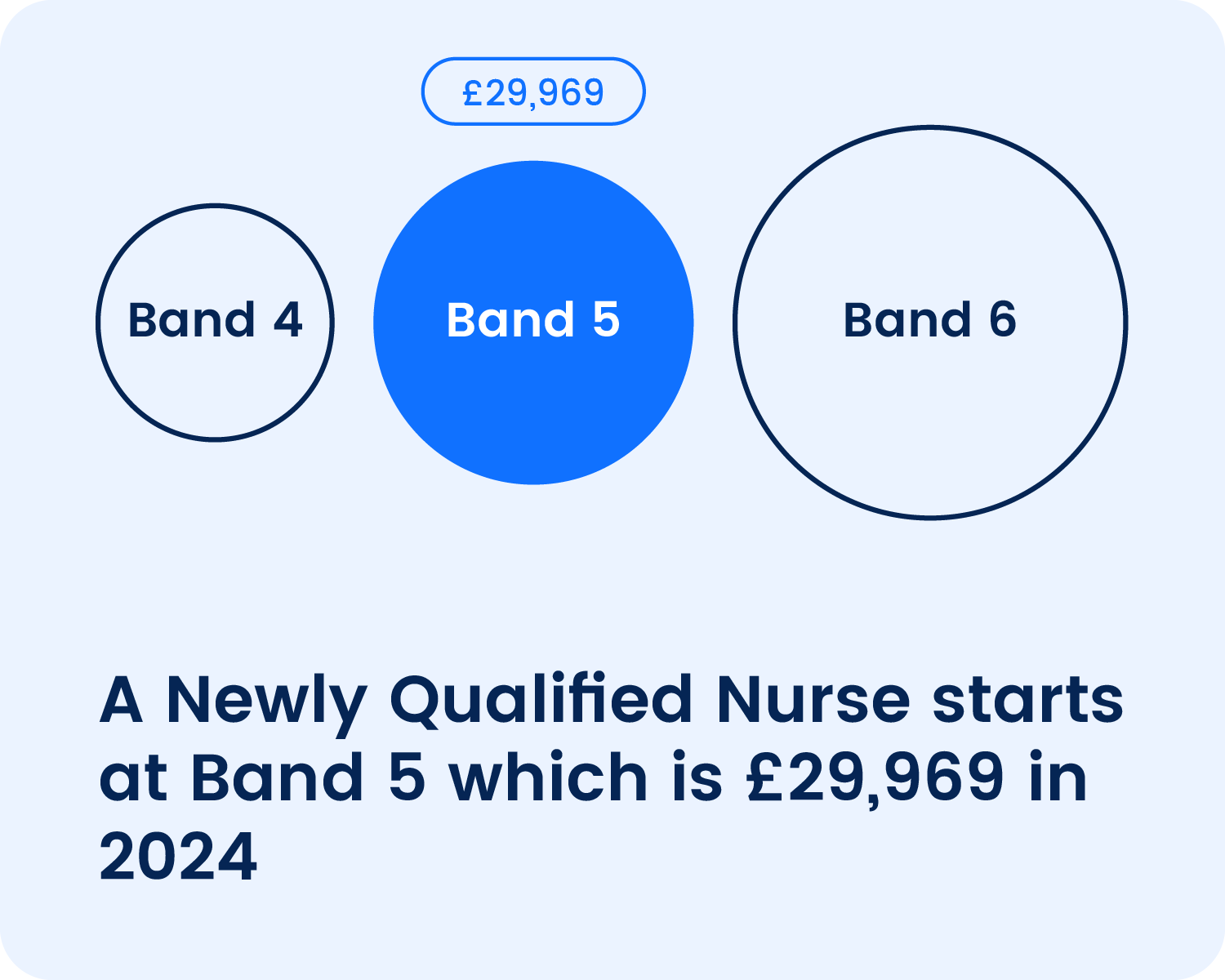

What Band Do Newly Qualified Nurses Start At?
All qualified nurses start at Band 5.
Nursing bandings are essentially the different levels of pay on offer to nurses according to their experience and qualifications. Newly qualified nurses automatically start at the bottom of Band 5 – regardless of whether you qualify as an adult, children’s, Mental Health or Learning Disability Nurse.
As you can see, annual incremental pay increases are granted within each banding – provided you keep up with your relevant training.
However, once you hit the top of your banding, you’ll only receive annual government increases. In a sense, this is similar to any other job; you hit the ceiling of earning potential within your role, and so to progress you have to look for a promotion or a new job. As a nurse, you’ll be looking therefore for a role that sits within the band above you, for which you will need suitable qualifications and experience.
Which NHS band are overseas Nurses placed into?
Guidance from the NHS suggests that qualified overseas nurses, once fully registered with the NMC, are placed into Band 5.
Beyond this, NHS advice suggests that overseas nurses can move immediately into higher bandings if they successfully apply for roles attached to those bandings.
However, there is a lot of anecdotal evidence that in many cases, even very experienced overseas nurses are placed into Band 5 on arrival.
Band 5 is a newly qualified level, so many deem this to be unfair.
It’s an issue that is regularly debated, but not without complexity. Different international qualifications and training programmes mean that the journey a nurse takes at different points in their career differs greatly from one country to the next.
What Level Of Responsibility And Duties Can You Expect Within Each Nursing Band?
Band 5 – Newly Qualified Nurse
As a newly qualified nurse, you’ll start at the bottom of Band 5. Typically, you’ll start in a hospital setting and then progress within your ward – gaining experience as you move up within your banding.
Many wards have a fairly clear career progression path in place from the very beginning, which helps you to plan ahead. Training opportunities will be vital not only to moving up within your banding, but to giving yourself the necessary skills to apply for Band 6 positions.
Band 6 – Senior Nurse, Health Visitor and Specialist Nurses
Band 6 roles will often involve similar tasks and responsibilities to Band 5 – but the vital difference is that they will be more specialised. A good example of a Band 6 job would be a health visitor, which would require some further qualifications. Equally, you might want to specialise in intensive care or long-term care, with these roles often coming with a Band 6 salary.
Ultimately, to progress to Band 6, you will need to pursue some further training within a specialist area – but the trust you’re working for will often provide funding or support for this.
Band 7 – Ward Manager, Advanced Nurse Practitioner
Band 7 roles typically require a Master’s level degree or equivalent – but again, trusts are often very keen to support their nursing staff in attaining these qualifications. And importantly, tasks and responsibilities really step up a notch. Common examples include Advanced Nurse Practitioners (ANPs), whose advanced training allows them to conduct detailed assessments, make diagnoses and prescribe medicine. In fact, at this level, a nurse’s role begins to include responsibilities you might normally associate with a doctor.
You can also progress to this level within a more detailed specialism. An operating department practitioner, for example, might prepare a patient for surgery and assist the surgical team. These advanced skills require a lot of extra study and many years’ experience, but it’s a career route that often begins with a standard Band 5 nursing post.
Furthermore, as a general point, some more managerial nursing roles (like a Ward Manager) may well fit into Band 7.
Band 8 – Modern Matron or Chief Nurse
For nurses, this banding reflects heads of nursing teams. You will still carry out many nursing duties, but you’ll also look after a large team of staff. At this level, proven management skills are essential, so it’s about experience and not just qualifications. Salaries can jump hugely in this banding, but that’s because of the extra responsibility and the inevitably long hours.
Band 9 – Consultant
Band 9 is exclusively for consultant level nurses. Here, you need to be an expert in your field – proven through experience and study. Like consultants or advisors in any other industry, you’ll be tasked with helping to shape high-level decision-making. Reaching this level will require a career-long pursuit of specialist skills and qualifications to supplement your vocational experience.
A final note on bandings and roles
While a newly qualified nurse will always be placed into a Band 5 role, from band 6 onwards the question of which roles fit which bandings becomes more complex.
A good example might be an Advanced Nurse Practitoner.
In most cases this is classed as a Band 7 role. However, where it’s slightly more specialised, it is occasionally offered as a Band 8a role (for example, something like an Advanced Neonatal Nurse Practitioner).
So any classifications of bandings and roles have to be seen as a guide only. Wherever you are in your career, the roles you aspire towards and which banding they are on could vary depending on the specialisation, and even the NHS Trust itself.
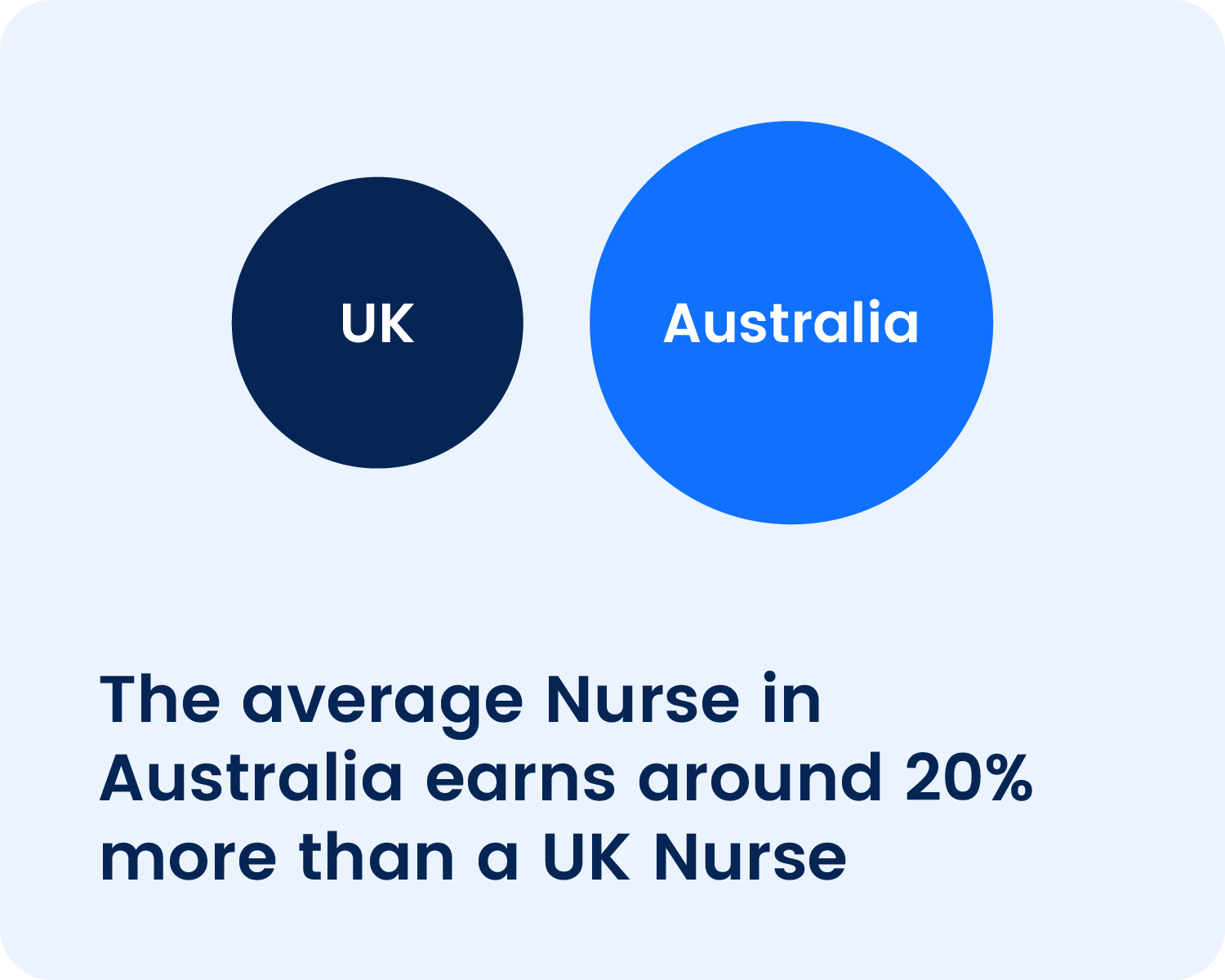
Find Healthcare Jobs
1000s of jobs for nurses, AHPs, clinicians, care assistants, managers and more. Jobs in care homes, hospitals, and the community.
The Right Pay For The Right Job - Browse Our Jobs
Ultimately, your route to getting the pay you need and deserve typically starts by finding the right kind of job. And when it comes to nursing jobs, we’ve got you covered.
To find your next role, head to
Government NHS Pay Review Body
Visit www.gov.uk/government/organisations/nhs-pay-review-bodyAgenda for Change Pay Deal
Visit www.gov.uk/government/publications/agenda-for-change-pay-deal-funding-for-2018-to-2019Scottish Government - Support for Student Nurses and Midwives
Visit www.gov.scot/news/more-support-for-student-nurses-and-midwivesAgenda for Change Pay Deal (about - Wikipedia)
Visit en.wikipedia.org/wiki/Agenda_for_ChangeNHS New Pay Deal Calculator
Choose your Pay Band and Pay Point (as it was in March 31st 2018) and it will show the incremental increases made during the transitional period of the New Pay Deal up to end of March 2021.
Your total change in earnings over three years
31 Mar 2018
£22,128
2018-2019
£23,023
+ £8952019-2020
£24,214
+ £2,0862020-2021
£24,907
+ £2,779Total change
+ £2,779
+ 12.56%
Inner London
| 1 April 2018 | 1 April 2019 | 1 April 2020 |
|---|---|---|
| 20% of basic salary, subject to a: minimum payment of £4,326 and a maximum payment of £6,663 | 20% of basic salary, subject to a: minimum payment of £4,400 and a maximum payment of £6,777 | 20% of basic salary, subject to a: minimum payment of £4,473 and a maximum payment of £6,890 |
Outer London
| 1 April 2018 | 1 April 2019 | 1 April 2020 |
|---|---|---|
| 15% of basic salary, subject to a: minimum payment of £3,659 and a maximum payment of £4,664 | 15% of basic salary, subject to a: minimum payment of £3,722 and a maximum payment of £4,743 | 15% of basic salary, subject to a: minimum payment of £3,784 and a maximum payment of £4,822 |
Fringe
| 1 April 2018 | 1 April 2019 | 1 April 2020 |
|---|---|---|
| 5% of basic salary, subject to a: minimum payment of £1,000 and a maximum payment of £1,733 | 5% of basic salary, subject to a: minimum payment of £1,017 and a maximum payment of £1,762 | 5% of basic salary, subject to a: minimum payment of £1,034 and a maximum payment of £1,791 |



